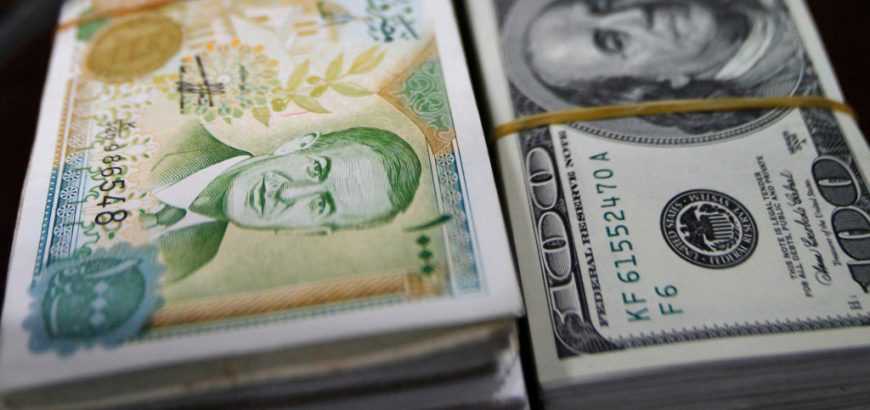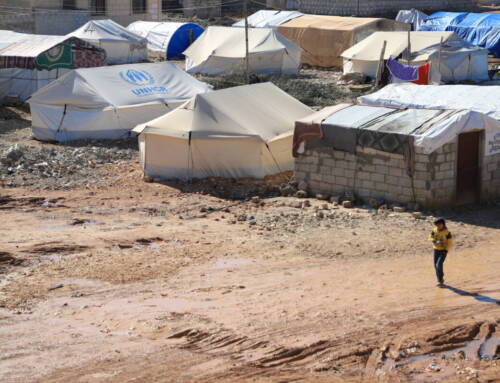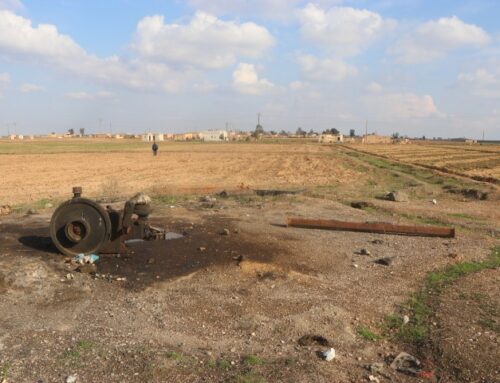Journalist: Syrian economy ‘teetering, but not in state of complete collapse’
The Syrian foreign ministry issued a decree on April 24 […]
3 June 2015
The Syrian foreign ministry issued a decree on April 24 to its embassies, instructing them to issue and renew passports and travel documents to Syrians abroad regardless of status, reported Al-Arabiya on April 25.
Nearly four million citizens have left Syria since the beginning of the war and now live abroad. At least 1.5 million of them need to renew their passports, reported SAS News late last month, citing statistics from economic analyst Mohammad Khalil. Passport renewals now cost $400, up from $200.
The government decree on passports is one of the measures the Syrian regime has taken to accumulate revenue. But while observers have looked to shaky data as a sign of its imminent collapse, the Syrian economy, and by extension, the regime, is still far from falling apart, says Iyad al-Jafari, the editor-in-chief of the pro-opposition economic news site Economy: Syrians’ Money and Jobs.
“We cannot say that the Syrian economy is in a state of complete collapse until the state treasury can no longer pay state employees’ salaries or finance state institutions,” al-Jafari tells Syria Directs Mohammed al-Haj Ali.
Here, al-Jafari, whose news site is an affiliate of Zaman al-Wasl, explains that even if the government cannot cover public-sector salaries, “this will not lead to a complete regime collapse, but rather will result in its reduced influence within Syria’s political arena and make it nothing more than a faction among several warring factions.”
Q: Can we say that the economic situation for the Syrian regime has begun to collapse given the large measures it has taken to attract foreign assets from abroad?
I believe the strongest indicator of a total economic collapse is the state treasury’s inability to cover employees’ salaries and other necessary and set monthly expenditures to continue the work of the state apparatuses and institutions.
Thus, we cannot say that the Syrian regime has entered a stage of complete economic collapse. Their quest to attract foreign exchange assets from abroad via the special decree on passports recently confirms that they have a foreign exchange reserve deficit, but that doesn’t mean they arrived at a state of complete economic collapse already.

Q: In your opinion will the economic decline affect current events in Syria now?
As I said, we cannot say that the Syrian economy is in a state of complete collapse until the state treasury is unable to finance the state employees’ salaries and run state institutions. When the above occurs, we can say that the Syrian economy is in a state of collapse.
As for what is happening now according to indications, the economy is teetering in areas under regime control and is indicative of a weakness and a warning that the regime may collapse economically unless they are able to put their affairs in order.
The regime has been able more than once to correct its affairs at numerous critical times. An example of this is what happened recently with the rapid decline of the Syrian pound last April, at which time the Syrian Central Bank injected a large amount of foreign exchange assets into the currency markets, which contributed to the large rise of the Syrian pound in the face of the dollar. This means that the regime is still able to correct its affairs up until now. It is too early to talk about an expected complete collapse of the regime’s economy at this moment.
As for how the complete economic collapse will have repercussions on the course of the military conflict, I think that the economic collapse will lead to the strengthening of the regime’s militia image. This means that the regime will transform completely into an armed militia in charge of geographic territory as opposed to a power running a country.
Despite that it will lose all that remains of its legitimacy in regards to the countries of the world and on the Syrian streets, this will not lead to a complete regime collapse, this will not lead to a complete regime collapse, but rather will result in its reduced influence within Syria’s political arena and make it nothing more than a faction among several warring factions. In other words, the complete collapse of the Syrian regime will only be militarily or through foreign intervention.
Q: What is the petroleum trade situation? Is the Syrian regime still getting revenue from petroleum trade or has that stopped?
With the last published numbers from those partial to the regime, we find that the regime lost around 97.5 percent of Syria’s petroleum production. They are only appropriating 2.5 percent of it, amounting to approximately 9,500 barrels a day. As for gas, the regime has lost around 50 percent of Syria’s gas. They control the other 50 percent at a daily rate amounting to approximately 15.5 million cubic meters.
Q: What is the foreign trade situation following the closing of border crossings with the Syrian regime, particularly the Nasib border with Jordan?
The regime is currently trying to market the ports of Tripoli and Latakia as points of alternative departure to the Nasib transit line with the knowledge that shipping costs by sea are twice or three times the cost as land transport. Yet despite that, a large number of merchants in areas under regime control are forced to depend on alternative sea trade in order to not lose their shares in the Arab and international export markets.
Recently, Egypt has allowed for visas to be issued to Syrian transit drivers departing on sea vessels from the Tripoli and Latakia ports so they can enter Egypt, either to sell their goods inside Egypt or to continue on their way to the Gulf countries. It seems that this way will be an alternative to the Nasib road for merchants despite the high price.
Q: In your opinion, has the new decision to allow all Syrians, regardless of their status, to extend and get issued passports had any effect on the Syrian economy? What have been the most recent solutions undertaken by the Syrian regime to support its economy?
Without a doubt, the decision related to easing the acquisition of passports by Syrians abroad from regime embassies will earn the regime huge monetary earnings. For example, in the regime embassy in Cairo alone, there are expected to be around 100,000 requests for passport extensions and renewals, with each passport costing $300. Thus, there will be around $30 million in earnings for the regime from only one embassy.
As for what else the regime is doing to support the economy, I believe that it is betting heavily on Iranian funding and support on one hand, and on the largest possible acquisition of taxes from the Syrians through all possible means [on the other]. This is what the regime has noticeably done during the past few months. They lifted subsidies on fuel and increased taxes and fees for most goods, services and economic activities. They also raised the prices of subsidized food goods.
Q: What has made the Syrian regime able to be steadfast economically until now, despite the many things that it has lost like foreign trade and economic recourses in the oil, agricultural, and production [sectors]?
It is necessary for the regime to acquire massive funding from Iran. This has contributed to its steadfastness and this is the main reason. However, there are also other reasons such as taxes and fees on Syrians. Also, wide swaths of Syria are no longer under the control of the regime, thus lightening its administrative and service costs.
Also, the regime ceased all investment projects in the country and is focusing now on only two matters: guaranteeing state employees’ salaries and covering the costs of managing state institutions, and the second matter being funding the regime’s instrument of war. This is in view of the fact that the regime provides its fighters with a margin of looting, stealing, and extortion of Syrians in a manner that excuses [the regime] from paying them monthly salaries. In other words, the regime allows their fighters to cover part of their funding themselves through unlawful means.







